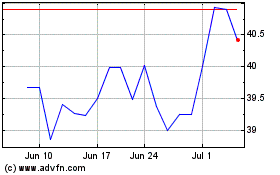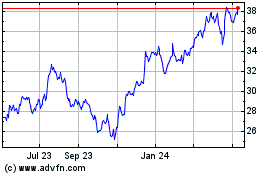By Rachel Louise Ensign
Bank of America Corp. said last week it would stop dealing with
private prisons. What the bank didn't say: it had recently agreed
to lend $90 million to one of the largest companies in the business
through 2024.
Bank chiefs today want to do more than make loans to
creditworthy borrowers. Encouraged by employees, executives are
using their trillion-dollar balance sheets to influence corporate
behavior. Many big shareholders support that approach.
Activists also have leaned on banks to rebuff certain
businesses, sometimes showing up outside of branches and at the
homes of CEOs. Housing advocates turn up at annual meetings to
press lenders to do more for needy communities. Environmental
groups have taken issue with loans involving the Dakota Access
Pipeline.
But cutting ties with entire industries has proven complicated.
Bank of America's announcement last week followed pledges to stop
lending to some fossil-fuel companies and gun manufacturers. But
because of pre-existing relationships, the bank is on course to
provide credit to some of them for years to come.
"The private sector is attempting to respond to public policy
and government needs and demands in the absence of long standing
and widely recognized reforms needed in criminal justice and
immigration policies," the bank said in a statement. "Clients
affected by the policy have unique circumstances and there are
often long-term relationships involved"
At Bank of America's annual meeting in April, activists peppered
executives with questions about its loans to private prisons.
Andrew Plepler, the bank's head of environmental, social and
governance, or ESG, said it was reviewing the business.
As the review was taking place, GEO Group Inc., which runs
prisons and immigration-detention centers, was looking to tweak a
$900 million loan. The revolving-credit line was so large that a
group of banks, including Bank of America, had come together to
make it, according to securities filings. That is a typical
practice in commercial lending.
Bank of America's ESG team vetted and approved the deal,
according to people familiar with the matter. The new revolver was
finalized on June 12 and the bank agreed to cover a $90 million
portion, according to a securities filing and people familiar with
the matter. The loan was extended to May 2024 from May 2021.
Soon after, reports surfaced of unsafe and unhealthy conditions
at immigration facilities that are holding migrant children.
On June 24, Sleeping Giants, an activist group that uses social
media to target companies and industries that it opposes, told
supporters to email Clayton Rose, a Bank of America director and
president of Bowdoin College.
In a Facebook post, the group wrote: "At Bowdoin, he has taught
'The Moral Leader' and advocates for 'thoughtful engagement in
civic life.' Can he comment on what's moral or ethical about Bank
of America providing lines of credit to enable crimes against
humanity?"
Two days after the email campaign to Mr. Rose began, Bank of
America Vice Chairman Anne Finucane, who oversees the bank's ESG
efforts, told Bloomberg News that the bank had "decided to exit the
relationship" with companies running private prisons and
immigration-detention centers. She said the bank would leave the
sector as soon as possible after fulfilling its contractual
obligations.
Rep. Alexandria Ocasio-Cortez, (D., N.Y.), tweeted in support of
the move. GEO Group said the announcement wouldn't affect its
recently renewed revolver.
The June deal means Bank of America could be tied to the
private-prison business for another five years. Other companies in
the industry also depend on the bank for financing, according to
regulatory filings. Last year, it covered $140 million of a $1
billion loan to CoreCivic Inc. that expires in April 2023. The bank
also extended $65 million of a $455 million loan to Caliburn
International Corp.
CoreCivic CEO Damon Hininger said his company has had a
relationship with Bank of America for about 20 years. Meetings with
the lender became more frequent over the past two years and the
company gave bankers a tour of a center holding immigrant families
in Dilley, Texas, he said.
"Up until last week, we were getting a lot of positive feedback
from them." he said. "It's clearly about politics."
CoreCivic and GEO Group run facilities for U.S. Immigration and
Customs Enforcement but say they don't operate border-patrol
holding facilities or centers for unaccompanied minors.
JPMorgan Chase & Co. in March said it would stop lending or
providing banking services to private-prison firms when their
current contracts expire. Wells Fargo & Co. two years ago
started ending its relationships with the firms. Both of those
banks used to be a part of the GEO Group loan but are no longer,
according to filings and a person familiar with the matter.
JPMorgan, however, remains a lender to Caliburn and CoreCivic.
Bank of America faces a similar situation with the gun industry.
In April 2018, Ms. Finucane, a close adviser to CEO Brian Moynihan,
told Bloomberg the bank would stop making new loans to some gun
manufacturers. Mr. Moynihan later said the decision followed
discussions with employees who had been affected by mass
shootings.
Sturm Ruger & Co. was briefly without a line of credit when
Bank of America let its loan to the gun manufacturer expire after
the pledge, according to regulatory filings. Wells Fargo stepped in
to take Bank of America's place.
Yet shortly before the gun pledge, Bank of America committed to
provide $43 million as part of a large bankruptcy-financing package
for gun maker Remington Outdoor Co., according to a court filing.
The bankruptcy financing replaced an earlier loan in which Bank of
America participated. Activists urged people to boycott the bank.
The bank has since sold its portion of the loan.
The bank has continued to lend to Vista Outdoor Inc., which
operates firearms division Savage Arms. Last November, Bank of
America and other lenders extended a new $559 million loan to the
company, according to filings. Vista Outdoor has said it plans to
sell Savage Arms business but has yet to do so.
Write to Rachel Louise Ensign at rachel.ensign@wsj.com
(END) Dow Jones Newswires
July 02, 2019 05:44 ET (09:44 GMT)
Copyright (c) 2019 Dow Jones & Company, Inc.
Bank of America (NYSE:BAC)
Historical Stock Chart
From Mar 2024 to Apr 2024

Bank of America (NYSE:BAC)
Historical Stock Chart
From Apr 2023 to Apr 2024
